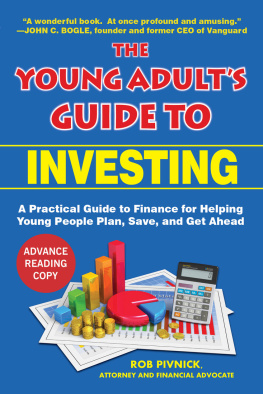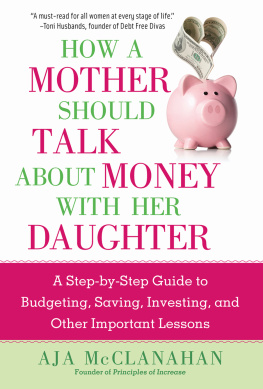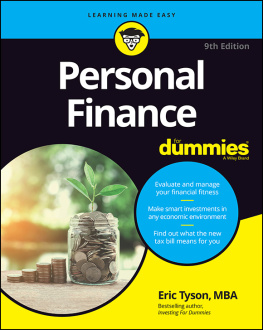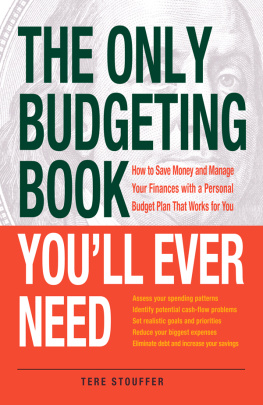

Copyright 2021 by Rob Pivnick.
Originally self-published in 2011 as What All Kids (and Adults, Too) Should Know About Saving and Investing .
First Racehorse for Young Readers Edition 2021.
All rights reserved. No part of this book may be reproduced in any manner without the express written consent of the publisher, except in the case of brief excepts in critical reviews or articles. All inquiries should be addressed to Racehorse for Young Readers, 307 West 36th Street, 11th Floor, New York, NY 10018.
Racehorse for Young Readers books may be purchased in bulk at special discounts for sales promotions, corporate gifts, fund-raising or education purposes. Special editions can also be created to specifications. For details, contact the Special Sales Department at Skyhorse Publishing, 307 West 36th Street, 11th Floor, New York, NY 10018 or .
Racehorse for Young Readers is a pending trademark of Skyhorse Publishing, Inc., a Delaware corporation.
LIMITATION OF LIABILITY/DISCLAIMER OF WARRANTY. The author makes no representation or warranty, either express or implied, with respect to the accuracy or completeness of the contents of this work and specifically disclaims all warranties, including without limitation, the implied warranties of merchantability or fitness for a particular purpose. No warranty is or may be created or extended by sales, donations or promotional materials. The advice and strategies contained herein may not be suitable for every person or situation. The end user of the material contained herein acknowledges and understands that the author is not rendering legal, accounting, investing or other professional advice or services. If professional assistance is required, the end user should engage a competent professional service provider. The author is not liable for damages arising herefrom. The fact that a source or work is cited herein does not mean that the author endorses such information or its source or recommends the same. End users should be aware that Web addresses listed herein may have changed or disappeared.
Visit our website at www.skyhorsepublishing.com.
10 9 8 7 6 5 4 3 2 1
Library of Congress Control Number: 2020930850
Print ISBN: 978-1-63158-537-1
Ebook ISBN: 978-1-63158-538-8
Printed in China
CONTENTS
INTRODUCTION
H ave you ever noticed that when you hear one of your friends saying Wanna bet? you only hear more about the bet if they won? No one brags if they lose a bet; but we always seem to know when someone wins a bet.

The stock market is pretty much the same. As a teen, you may get a job, earn money from chores or allowance, and maybe eventually go to college. And hopefully you start thinking about investing some of the money youve earned. As you get older you may begin to hear your friends or coworkers brag about how they doubled their money in just one week by buying some particular stock, or generally how they made a bunch of money in the stock market. And then you might think you can do the samethat you can pick a great stock winner, or that you are smarter than an investment professional whose job it is to manage investments. But dont fool yourselfyou will just be gambling, just like anyone who asks Wanna bet?
The reality is that no one can beat the market. Anyone thinking they can pick a no-brainer stock winner isnt investingthey are gambling. I didnt want my kids or any other teens falling into the trap of thinking that they can beat the market, so I wrote this book for them and all other readers.
The truth is that no one can consistently beat the market. The professional money managers cant even do it, and they have teams of highly paid and intelligent analysts, as well as powerful computers that run models and algorithms to help them. People may read about some money manager or fund that outpaced the market for a while, maybe even for a few years. But the fact is that only about 15% of them can keep doing it year after year after year. In fact, almost half of all funds end up going out of business because they dont perform. And each of these funds charges its investors a lot of fees/expenses... just so they can underperform!
Hopefully this book will show readers of all ages that they should invest in certain funds that copy the market (but only those funds that have little or no fees/expenses), as well as not to continuously trade in and out of a stock or fund to chase great returns. Because not only can investors not beat the market, but they cant time the market either. Good investors shouldnt always believe what they read or see in the news about a certain company or investment. If you are investing for the long term, you should just ignore the hype and invest smartly. Generally (unfortunately), we are all terrible investorsand the data proves it. Our best chance for successful investing is to just try to match the marketto just be average.
Investing for the long term is actually pretty simple, if you can tune out all the noise and not think you are smarter than everyone else. Ive also included a few life lessons about budgeting and negotiating too, just for good measure. I hope you enjoy this book!

TAKEAWAYS
Start saving early; let compounding work wonders for you!
Pay credit card debt every month in full.
Set goals; make a budget and stick to it.
Everything is negotiable.
Find out what is important to the other personask why questions.
Invest your money in safe investments if you do not have a lot of time to make your money back or if you need the cash quickly. Take more risk (for higher reward) for longer term savings goals.
Invest in indexes; dont be a fool and try to beat the market!
Do not try to time the marketyou cant! Buy and hold is the best long-term strategy.
Do not chase returns!
The market always reverts to the mean.
Minimize expenses, invest in low-cost index funds.
Dont put all your eggs in one basket. Stay diversified and follow a plan.
Only hire a professional financial advisor if you really need onedont automatically assume you should hire one.
You are a terrible investorremember that you cant beat the market. Buy low cost ETFs and ignore all the hype and news.
While you should absolutely plan for the future, dont lose sight of the present. Enjoy your life now. Its not all about money.
Pursue your passion and curiosity rather than moneyodds are youll end up both happy and financially secure anyway.
Why Save?
T he experts say that good saving habits can begin in children as early as three years old... so if you are old enough to read this, you are old enough to have some of these habits. Financial skills are one of the most important skills you will need to navigate your life and those skills start with learning to save and budget.
whoever they are...

Unfortunately, at least here in the United States, saving is not a part of most peoples behavior. Maybe its because they did not develop savings habits when they were youngso lets change that.
Next page












